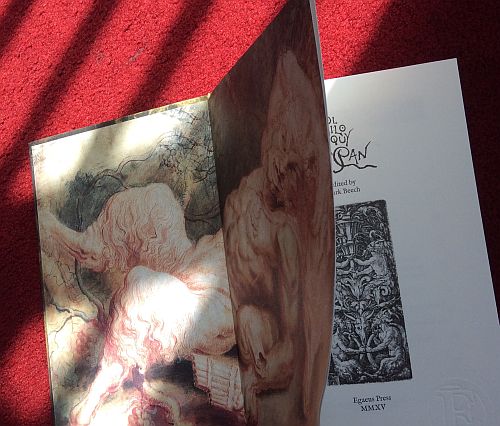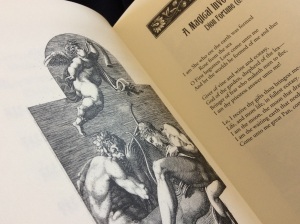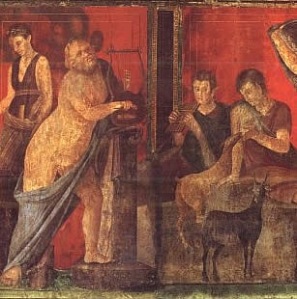Cloud Atlas by David Mitchell

.
I am about to start reading CLOUD ATLAS by David Mitchell (2004).
If I happen to real-time review it, my thoughts will appear in the stream below or be found by clicking on this post’s title.
My earlier comments on his THE BONE CLOCKS here.
A real-time review by Des Lewis.











“‘Come, Adam, a wise man does not step betwixt the beast & his meat.’
Sunday, 10th November –
Mr Boerhaave sat amidst his cabal of trusted ruffians like Lord Anaconda & his garter- snakes.”
I am just into the first couple of pages, and I admire the (perhaps unintentional) play of ‘cannibalism’ with ‘cabal’!
“I protested, to civilize the black races by conversion should be our mission, not their extirpation, for God’s hand had crafted them, too.”
A Dreamcatcher real-time review approach to this book seems so far ideal for matching its real-time, well-textured narration about now scandalous mores of the White missionary, coloniser, trader of yore, e.g.
“Wednesday, 13th November – I come to my journal as a Catholick to a confessor. My bruises insist these extraordinary past five hours were not a sickbed vision conjured by my Ailment, but real events. I shall describe what befell me this day, steering as close to the facts as is possible.”
The hanging heart, man’s or animal’s?
“‘But d— me if I pay a stowaway a single cent. He’ll work his passage to O-hawaii. If he’s no shirker he may sign articles there in the regular fashion. Mr Roderick, he can share the dead Spaniard’s bunk.’
I have worn away a nib in narrating the day’s excitements. It is grown too dark to see.”
Then stowaway’s backstory… But such proceedings interrupted in real-time by a seemingly unconnected
NEW STORY
Letters from Zedelghem (Part 1)
“Knew I’d become the greatest composer of the century if I could only make this music mine. A monstrous Laughing Cavalier flung against the wall set off a thumping battery of percussion.”
It’s refreshingly like some wittily verbal shyster-wordmonger of a musically trained Eric Fenby type (Frobisher) writing real-time letters to someone about his visit to a Frederick Delius type (Ayrs). (See my review of Robert Aickman’s ‘Notes on Delius’ HERE.)
Fenby near the Fens of Belgium, as filtered through Magritte?
When Ayrs mimics his own viola theme to Frobisher, I was reminded of Mitchell trying inchoately to fix his novel’s gestalt upon me, me the real-time reviewer or DREAMCATCHER of his book’s leitmotifs!
“Château Zedelghem isn’t the labyrinthine House of Usher it seems at first. True, its west wing, shuttered and dust-sheeted to pay for modernization and upkeep of the east, is in a woebegone state, and will need the demolishers before v. long I fear. Explored its chambers one wet afternoon.”
Robert W Chambers – Lethal Chamber Music?
“After ten pages I felt Nietzsche was reading me, not I him,…”
Mitchell reading this review of mine? Or Frobisher is reading the truncated Adam Ewing account in the first part of Cloud Atlas? Mid 19th century meets early to mid 20th century around the serendipitous conduits and bends of the ‘synchronised shards of random truth and fiction’?
Indeed, blind visually, or spiritually?
“‘Without a thorough mastery of counterpoint and harmonics,’ V.A. puffed, ‘this fellow’ll never amount to anything but a hawker of fatuous gimmickry. Tell your friend that from me.’ I fumed in silence. V.A. told J. to put on a gramophone recording of his own ‘Scirocco Wind Quintet’. She obeyed the truculent old bully. To console myself, I remembered how J.’s body is under her crêpe-de-Chine summer dress, and how hungrily she slips into my bed. V. well, I shall gloat a little over my employer’s cuckold’s horns. Serves him right. An old sick prig is still a prig.”
Hawser –> Hawker –> Hawler?
I have been listening to ‘La Creation du Monde” by Darius Milhaud, while reading about V. Ayrs arriving musically hot-footed with a new theme to be ‘fixed’ by Frobisher, in the middle of the night, and Mrs Ayrs vanishes into a hill of bedcovers having been there to be tupped by Frobisher, our real-time epistolarian, a Rossini sex romp as well as a Thomas Mann Magic Mountain or Dr Faustus of classical music twist and turns…
Some speaking French in this section as well as a freehold author-god’s procreation of this world, a world that is this book postcreated from real-time accounts, later recreated retrocausally by these my own real-time review accounts of reading such earlier real-time accounts of past events…
Elgar, yes Elgar himself is in this book! A realperson as a fiction! As for me, I think that Anton Webern was BOTH a fraudster and a messiah.
“Ayrs wanted to unveil his concepts for a final, symphonic major work, to be named ‘Eternal Recurrence’ in honour of his beloved Nietzsche. Some music will be drawn from an abortive opera based on ‘The Island of Doctor Moreau’ whose Viennese production was cancelled by the War, some music V.A. believes will ‘come’ to him, and its backbone will be the ‘dream music’ piece that he dictated in my room that hairy night last month,…”
I speculate that brief mention of the HG Wells Dr Moreau story may become relevant. Isn’t it about creating humans from animals by vivisection? La Creation du Monde…
And this section of Mitchell’s book ends with a theme and variations on a bonfire.
1 – 17
Is this book a prediction in 2004 of the Internet Cloud, as was Stephen King’s similarly dated novel DREAMCATCHER (my review HERE)?
Rufus Sixsmith is now age 66 with discos and so forth but I sense more seventies than naughties? He was the recipient of Frobisher’s real-time letters about Ayrs in 1931.
Meets journalist younger Luisa in a broken down lift. Somehow tips her off about the story of a new reactor – perhaps that of CERN Zoo, perhaps not, I guess – that is rife with scandalous danger. A real story for her.
Prospect of a Hitchcockian or Wellsian climax to this cinema of words, and various well-characterised characters of ill-suitable age gaps.
“He spoke in ‘bons mots’ like that, not to you, but into the ear of posterity, for dinner- party guests of the future to say, “That’s one of Hitchcock’s, you know.””
“Anything is true if enough people believe it is.”
“YOU ARE NOW ENTERING CANCER ISLAND,…”
18 – 30
“If it wasn’t me it’d be the next fixer in the Yellow Pages.”
Luisa involved in Conspiracies and dreamcaptchas concerning the new megacorporate power source, who supports it, who seeks its destruction, plus the Sixsmith letters from Frobisher, a coincidence of a matching tattoo, alias masks, a hitman, but only false plot spoilers here in this review. Like some shades of Robert W. Chambers ‘The King in Yellow’….
“The well-dressed man on the telephone, pallid for this tanned city, repeats the inquiry: ‘Cloud Atlas Sextet … Robert Frobisher …’ ”
Or theme and variations on the Internet Cloud…
“Coincidences happen all the time.”
Compelling stuff.
31 – 39
‘Men invented money. Women invented mutual aid.’
Gender and Journalistic politics…and other tontinnabulations….?
And the lethal report left in a Beetle named The Grateful Dead. An inverted Tontine?
So ends this section, with the coordinates of this book’s intriguing pattern or atlas still accretively triangulating…
The Ghastly Ordeal of Timothy Cavendish (Part 1)
\”bookkeeping front.”
So far, this (in a scintillatingly witty literary weirdtongue-in-cheek), hilariously reminds me of the fiction bookworld satire in ‘The Bone Clocks’ and there is another Martin Amis reference here. But, more, it reminds me of an argument over a review of one of my own fiction works whereafter I also threw its perpetrator from the Last Balcony!
Well, sort of.
It is also redolent of Jerry Cornelius Cardew and department store roof-gardens. And much else.
Another sixty something like me is Mr. Cavendish.
“Odd how the wrong stories pop into one’s head at my age.
It’s not odd, no, it’s ruddy scary. I meant to begin this narrative with Dermot Hoggins. That’s the problem with inking one’s memoirs in longhand. You can’t go changing what you’ve already set down, not without botching things up even more.”
Real-time reviewing is also sacrosanct once each section of the review is posted electronically. Thereafter, indelible. Except I print hard copy books of my real-time reviews once they’ve caught their dreams, as belt and braces.
“A jazz sextet kicked off a rumba. I went on to the balcony for a breather, and surveyed the hubbub from without. Literary London at play put me in mind of Gibbon on the Age of the Antonines. A cloud of critics, of compilers, of commentators darkened the face of learning, and the decline of genius was soon followed by the corruption of taste.”
Jazz sextet? Cf Cloud Atlas Sextet, earlier.
“I disapprove of backflashes, fore-shadowings and tricksy devices, they belong in the 1980s with MAs in Postmodernism and Chaos Theory.”
Retrocausalities are quite different, though, I suggest, Mr. Cavendish. The Large Hadron Collider, notwithstanding.
\”a puppy…’ ”
Witty, written with some skilful flair, but mainly satiro-farcical, these pages tell of publisher Cavendish, to avoid gangsters, being exported to present day archetypal Essex (or present day Essex when this book was written), the county where I currently read this book and write this review. With him, meanwhile, he has the typescript about Luisa Rey to consider, I infer.
\”everything right.”
“Despondency makes one hanker after lives one never led. Why have you given your life to books, TC? Dull, dull, dull! The memoirs are bad enough, but all that ruddy fiction! Hero goes on a journey, stranger comes to town, somebody wants something, they get it or they don’t, will is pitted against will. ‘Admire me, for I am a metaphor.’”
Author and reviewer alike. Continues with satiro-farcical mien, combined with nightmarish curdling of art metaphors and real modern life, mixed with other visions, as he heads from Essex finally to a haven in Hull! A publisher called Cavendish grasping Half-Lives to him, in retreat from London’s gangsterisms. ‘The synchronised shards of random truth and fiction’ as I have long called them.
“The dog rose, scenting vulnerability. An invisible guardian took my elbow and led me to a taxi rank. The taxi seemed to have been going round the same roundabout for a miniature eternity. A howling singer on the radio strummed a song about how everything that dies some day comes back. (Heaven forfend – remember the Monkey’s Paw!)”
My bold. My Adlestrop.
Where on that Atlas is my version of Area X?
\”was weak.”
Despite its satiro-farcicality, I am delighted by Aurora House where Cavendish is staying – a sort of hotel becoming a cross between ‘The Hospice’ by Robert Aickman and The Inmates by John Cowper Powys. Those who have read these two fictions will know exactly what I mean.
Should he stay, or should he go?
CAN he choose which?
“We’re here to help you reorientate.”
Whether this Aickmanite ‘hospice’ is a care home or a Tarr & Fether asylum from Powys’ ‘Inmates’, this continues and concludes (so far) as a hilarious, if only slightly amusing, satiro-farce. It sure had me going though about my own old age, and what is in store for me when I become even older! Onward to the next section of this book, without looking back….
\”xec postgrad aiming so high?”
“So when Seer Rhee noticed Yoona ~ 939 ’s deviations, he bypassed destarring and summoned a corp Medic to have her reorientated.”
From the ‘reorientate’ in the previous Cavendish ‘care home’ scenario, to this parallel one in a SF dystopian world of fabricants, and the method of keeping these fabricants as clones rather than their ascending above this state… I was worried that I might not enjoy this scenario but I have been soon sucked in by the interview technique. And by its quality SF techniques of telling this story. Didn’t much like the seemingly gratuitous omissions of ‘e’ before ‘x’ in ‘ex’ words and the use of lower case trade names like ford and sony.
“The deviancy was an inevitability awaiting a trigger. During the New Year Sextet, when every day was busy with holiday crowds,…”
“A gas called evil xists in the world, Papa Song said. When purebloods breathe in this gas, they change. They become terrorists. Terrorists hate everything that is good:…”
Comet tattoo.
“First, a voice began speaking inside my head. It alarmed me greatly, until I learnt nobody else heard it; the voice of sentience. Ascension was an alarming xperience, especially in the aftermath of Yoona ~ 939 . All over Nea So Copros, purebloods were scrutinizing fabricants’ behavior for signs of unwarranted intelligence and reporting them for reorientation at the rate of hundreds per week. Second, my language evolved, much as Yoona ~ 939 ’s had.”
I still await with literary bated breath this section’s further connections in the pattern of the whole book. Deviant or defiant?
Sextet Eve
Sextet Recess
Why are words ending -ight always spelt -ite?
It’s as if this and the x words are truncated to help put off pirate ebooks. No advertising without Upper Cases, so it’s coca cola to avoid the bots.
The enquiring eclecticism of our heroine fabricant gives her away as the supreme ascendent. The Ascendent Sign is just as important as the Sun Sign. Then intrigue, conspiracy, disguise, as a glimpse of their past in an ancient cinema film of The Cavendish section sort of clinches a harmonic of truth when dystopia was born. In your heart. And MINE. Today.
If you want the real plot summarised, no doubt you can google it. Meanwhile, it all kept me locked in. Great SF. Great descriptions in the accreting answers of the answerer, but is she in disguise, too?
“She had chosen the Rothko canvases in the hope I would find them meditative. ‘Molecule-for-molecule copies of the originals,’ he assured me, though I had no idea what ‘Rothko’ meant, ‘though one may argue no originals remain in our world. The artist’s style seems resonant of your own position, Sonmi ~ 451; he painted how the blind must see.’”
I am a fabricant, too, being ‘ascended’ by this book. I am.
A txt giving me an xam. I can give it no greater praise. So far.
Sloosha’s Crossin’ an’ Ev’rythin’ After
\”To Pa’n’Adam.”
I usually can’t endure (other than normal words like that “can’t”) elided narrative or dialogue to convey a down-to-earth dialect etc. and I often cast off such books who have a lot of it. I am only a few pages into this new section, and I am sorry to say that this particular version of elided prose is no exception, But it seems to compare significantly with the elided x-words etc. in the previous section!
Also when studying skies and their cloud atlases, it is inevitable that you can only look at one section of the whole sky or cloud atlas.
However, I cannot bear to read this section of the book (my loss). I have read the plot summary of this section in the otherwise wonderful book’s Wikipedia, so that I can continue reading the remaining sections. Cheating I know, but inevitable.
And I managed to ecleticise the passage below, serendipitously, as part of my real-time account of preternaturally reading any book, its warts and all, including my own exegesis of it and any interruptions / eccentricities from surrounding personal life while reading it, for good or ill.
“Souls cross ages like clouds cross skies, an’ tho’ a cloud’s shape nor hue nor size don’t stay the same it’s still a cloud an’ so is a soul. Who can say where the cloud’s blowed from or who the soul’ll be ’morrow? Only Sonmi the east an’ the west an’ the compass an’ the atlas, yay, only the atlas o’ clouds.”
[A paragraph describing a personal account of my cloud-racing as a child till now as an old man, can be found in my old story shown here: http://weirdmonger.blogspot.co.uk/2008/07/round-headed-club.html ]
“The breeze was fragrant with pollen and sap; clouds scrolled. Once- genomed moths spun around our heads, electron-like; their wings’ logos had mutated over generations into a chance syllabary.”
Having read the rest of this intriguing ‘interview’, without giving away any spoilers regarding the plot itself, it has dawned on me that this book is about ‘retrocausality’, a buzzword that I have used in my dreamcatchers or real-time reviews for many years. Here, the retro-audit trail of the creation of a messiah or goddess in our ancient future from our own past, via the present, partly by means of a retained residue of electronic communication, like, say, internet Clouds as well as the metaphor of real clouds.
It also puts a complete new slant on the phrase ‘The Last Balcony’!
I am agog and mind-boggled.
\”word in his life.”
“Time, no arrow, no boomerang, but a concertina.”
We retro-forge on, finding Cavendish has had a stroke – a teeny weeny one – in his Hell in Hull home for the elderly.
A brilliantly touching, true-but-farcical and, for elderising me, infuriating sketch of old age and its fallibilities – and its paradoxical, retroactive strengths, no doubt.
“Putting Timothy Cavendish together again was a Tolstoyan editing job… […] Memories refused to fit, or fitted but came unglued. Even months later, how would I know if some major tranche of myself remained lost?”
“Mother used to say escape is never further than the nearest book.”
Very telling as well as his ‘comet tattoo’ now nicknamed Timbo’s Turd.
Modern lepers, all of us. Even you.
“What wouldn’t I give now for a never-changing map of the ever-constant ineffable? To possess, as it were, an atlas of clouds.”
Or a retrocausal atlas of pre-existing Mitchell novellas made into a single novel with appropriate electronic jump-leads between them, spanning aeons?
This section is again hilarious, with JC Powys’ ‘Inmates’ and Aickman’s ‘Hospice’ to the power of dirigible through the clouds. Conspiracies of Cavendish’s escape from the Aurora, phone calls to a gone-crazy sister-in-law and much more. Witty, satirical, on the brink of gone-crazy itself. Reviewer is crazy, too. Thinks he is a Dreamcatcher. Catch that!
“Ruddy hell, when your parents die they move in with you.”
Like these six novellas? But which direction the Time Arrow’s audit trail? Which the sky, which the scion?
Escape from the Carehome by car, like an Ealing Comedy. Good rendition of pub watchers of needle football match.
So ends the Timothy Cavendish novella and his purchase of the Luisa Rey project… After incriminating video of the gangsters wrecking his erstwhile business.
40 – 45
“…the right to ‘landscape’ the virtual past.”
This virtual past and its inverse of a virtual future (a concept slowly accreting, by my reading and reviewing this book in my real-time, hence its virtual present as well as mine) clinch, for me at least, the vital need for Luisa to expose Seaboard’s threat to the world and thus scotch this threat beyond any simple football game in a future pub, and also to allow history to pan out as a new future wherein Delius and Fenby once lived – or will live as Ayrs and Frobisher through the Sixsmith letters.
Sixsmith – sextet – six novellas.
“Lying’s wrong, but when the world spins backwards, a small wrong may be a big right.”
Is it significant Spinoza is the name of the police station where the policeman who said that works, bearing in mind Spinoza’s famous quote about the past and the present? Is it significant that Spinoza has almost the same forename as Obama who is President in this book’s own future? Is it significant that Luisa feels that she has already heard the Cloud Atlas Sextet? Is it significant that she is fired from the newspaper when a firm connected with Seaboard takes it over? Are any of those questions plot spoilers? Am I the first ever reviewer reviewing this book in real-time?
Some things I have said about real-time reviewing in the past are shown HERE and HERE. Now becoming more relevant with my reading of CLOUD ATLAS.
“He wonders if he is a baby in his cot or a man dying in his bed.”
The industrial spy thriller reaches its Hitchcockian finale, with explosions and suspenseful revelations. Seaboardgate, President Ford, even the shadow of Lester del Rey the SF author and editor. The outcome is beyond the spoiler-gate of any review, and I am left with the thought that now the trail forward into 1931 is about to be carried upon the texture of real paper rather than electronic images, except I happen not to be reading this as a realbook but an ebook. A rare event for me and a retro-paradox.
\”of Baker Street?”
“…farmers still daren’t plough the land for fear of unexploded ordnance. One cannot pass by without thinking of the density of men in the ground. Any moment, the order to charge would be given, and infantrymen well up from the earth, brushing off the powdery soil. The thirteen years since Armistice seemed only as many hours.”
Wars are another form of elision or literary exegesis. Another war is always coming. Always.
Ancient Letters another form of future world interview.
‘To Those upon the Menu, the Sauce is no Concern.’
“The syphilitic decays in increments, like fruit rotting in orchard verges.”
Another form of -x elision. OR that damned dialect imitation by inverted commas.
“…a ‘sextet for overlapping soloists’: piano, clarinet, ’cello, flute, oboe and violin, each in its own language of key, scale and colour. In the 1st set, each solo is interrupted by its successor: in the 2nd, each interruption is recontinued, in order. Revolutionary or gimmicky?”
A normal novel would be more like a famous Brahms Sextet, each instrument in the family of violins.
“Frobisher, when you grow up, you’ll find that all composers draw inspiration from their environments. You’re one of many elements in mine,…”
That enormous plagiaristic real-time gestalt Jungian undersump?
‘Mr Frobisher, are you well acquainted with Sherlock Holmes of Baker Street?’
Apt, with my having just watched the new film MR. HOLMES starring Ian McKellen, a film, not unlike the Cavendish film, with bearing on Cloud Atlas as Cloud Atlas has bearing on the retrocausal plot of MR. HOLMES. Headstones for ghosts.
“The van de Veldes are five never-ending, ill-tuned harpsichord ‘allegretti’ and my ears rang with gratitude to be free of ’em.”
V. elisionary, I’d say. And five with E. making six?
“…E. said, looking away, ‘I’ve thought of this balcony as my own belvedere,…'”
I know I have been sarcastic about certain aspects of this book, but there is some great writing beyond the scope of most modern literature, not least in this section, in the epistolarian’s relationships with Sixsmith, Eva, Jocasta and Vyvyan Ayrs. And the balustraded circular last balcony of the plot. V. poignant and crazily witty.
“Most uncanny. Not quite déjà vu, more jamais vu. Killing, an experience that comes to few outside wartime.”
“One may transcend any convention, if only one can first conceive of doing so.”
As perhaps I see it my duty to transcend even this book with a Review of it!
“Writing is such a damn lonely sickness.”
“Echoes of Scriabin’s White Mass,…”
Back to Solzhenitsyn’s E Wing…
\”of drops?”
“…the harum-scarum world of the fo’c’sle.”
That’s ultimate focus on elision, and now:
‘D___ my eyes, what am I thinking? It’s the Sabbath, by G__ & these holy s__s’ll be a- braying…”
“It is Progress that leads Humanity up the ladder towards the God- head.”
The Miscegenation of Morality, as one leitmotif of this last section, while Ewing fights both a giant cockroach and the Worm parasite in his head. You? Or someone acting on thy behalf? No spoilergate here.
“The Weak are Meat the Strong do Eat.”
Like that ‘sauce’ quote from the previous section of the ampersand,
“Eat or be Eaten.”
Pecking-orders of author, narrators, characters, readers, but….
AUTUA: You as Author.
This whole book is like a giant ampersand, and among the ants of print are many ampersands in this final section of text. Arguably, the whole book’s plot or audit trail (the global time ‘Crossing of the Line’ explicitly happening in this section) moves like an ampersand, i.e. from the Tail to its T-Junction. Just follow it for yourself and see if I am right. It’s not a loop at all. Not an entropic symbiosis. It’s an entertaining means of sublimation to make fashionable Anti-Natalism (suicide being a major recurrent theme in this book) just another ‘and’….
“The colour of monotony is blue.”